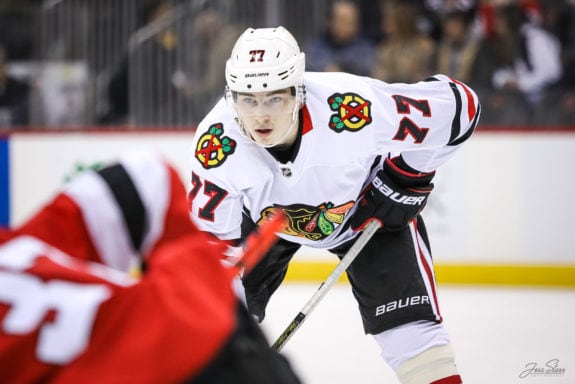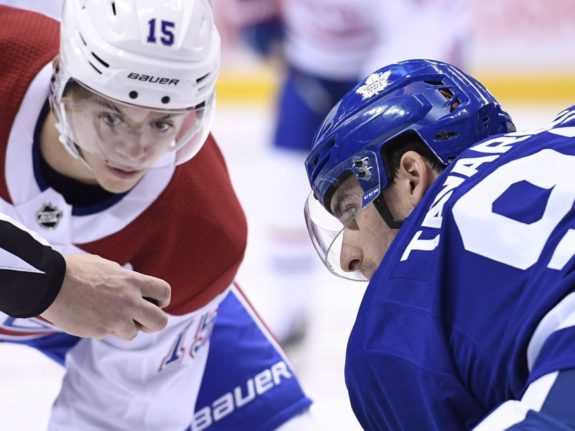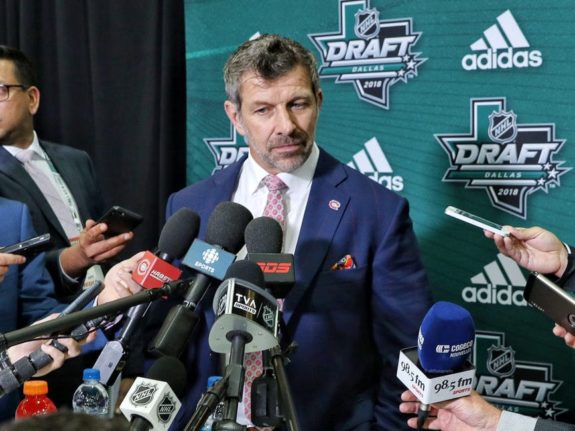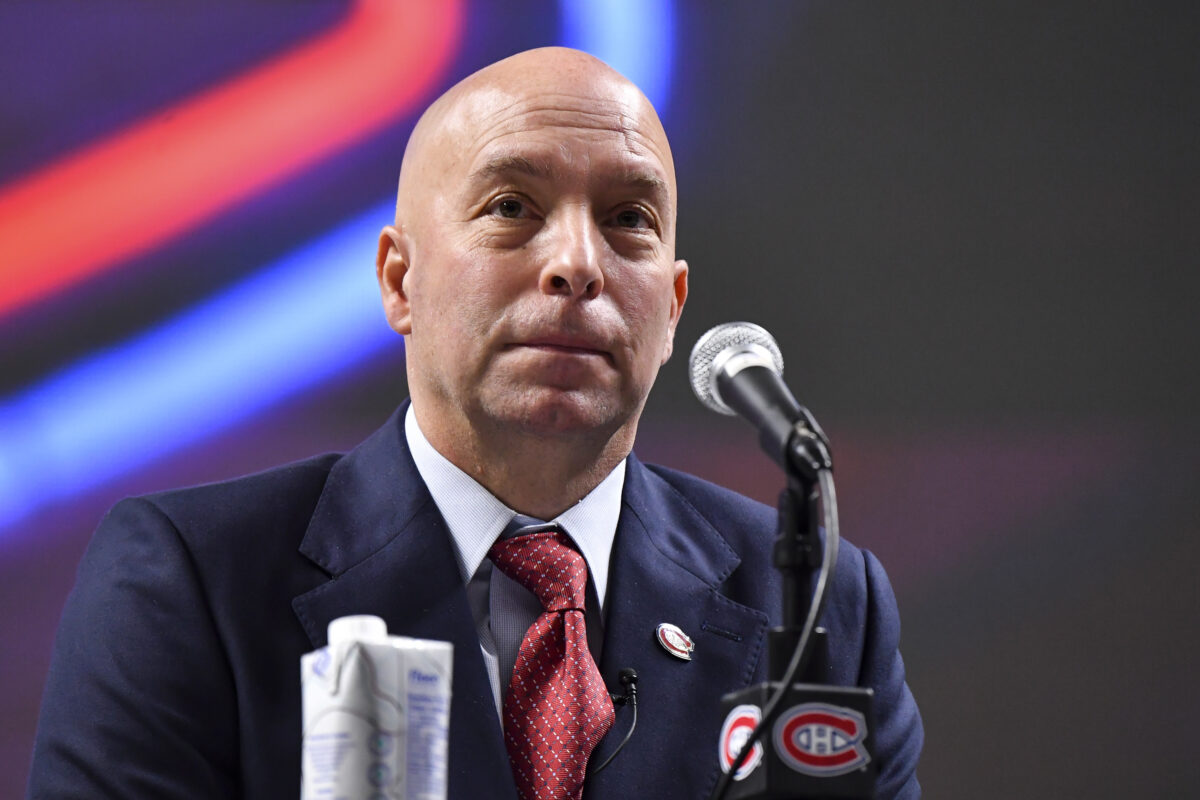One year after the Jesperi Kotkaniemi saga, it keeps sending ripple effects through Montreal Canadiens fandom. For some, its less-than-ideal outcome, with Kotkaniemi getting signed to an offer sheet by the Carolina Hurricanes, has altered the perception of negotiations with another potential star center once taken third overall in Kirby Dach.

No one should be sweating though, as there are key differences in negotiations between each of them and the Canadiens, firstly the men in charge: current general manager Kent Hughes and his predecessor Marc Bergevin.
Bergevin’s Negotiations with Kotkaniemi
Obviously, there’s a honeymoon period with every general manager. There was a time Bergevin could do no wrong as GM, but the simple fact is Bergevin ended up making big mistakes over his decade at the helm of the Habs, including with regard to how he handled negotiations with Kotkaniemi.
True, negotiations with Kotkaniemi probably dragged on in part because Kotkaniemi’s father had been diagnosed with cancer. However, Bergevin shot himself in the foot several times, assuming he had actually intended on re-upping the Finnish center to a sophomore deal.
Firstly, Bergevin didn’t exactly show confidence in Kotkaniemi talking to the media after Phillip Danault signed with the Los Angeles Kings as an unrestricted free agent, thus opening up a center spot on the top two lines. Said Bergevin at the time, “In a perfect world, I’d like to shelter KK more” (from ‘Stu Cowan: Canadiens counting on young centres to take next step,’ Montreal Gazette, July 29, 2021).
There is an argument to be made that Bergevin was simply being honest (to a fault). However, it was also a trend on Bergevin’s part over his decade on the job to downplay his players’ worth to the team ahead of negotiations. He did it to Alex Galchenyuk, yet another third-overall pick drafted to be a center, time and again. That tough-love approach hardly worked with him. Why would it with Kotkaniemi?

Secondly, you’re talking about your only real option to play on the second line at center at the time. Bergevin had no one else. So, when he said in the same quote, “it could be done internally,” no it couldn’t have, as evidenced by his eventual acquisition of Christian Dvorak. So, Bergevin essentially took a risk that he would alienate his defacto No. 2 center for no other reason than, what? Salary-cap management? There’s no way to prove it other than cold logic, but Dvorak’s $4.45 million cap hit is probably higher than what Kotkaniemi’s would have been had he stayed with the Habs. They also would have been able to keep Kotkaniemi under team control longer than the four years they’re poised to get out of the former.
Canadiens Miss the Mark on Kotkaniemi
Bergevin talked about sheltering Kotkaniemi later on in the same quote cited above. It’s ironic, because as GM it was arguably part of his job to protect his players from negative press. He didn’t in this instance, far from it. He seemingly encouraged it.
Furthermore, it’s not like the Hurricanes offer sheet Kotkaniemi ultimately signed came out of nowhere. If the fact Bergevin had unsuccessfully offer-sheeted Hurricanes forward Sebastian Aho ahead of time wasn’t heads-up enough, how about an actual heads-up from the Hurricanes that they were interested?
According to Hurricanes Don Waddell, they had tried to work out a trade for Kotkaniemi the previous month. Only after the two sides couldn’t work something out did the Hurricanes sign him to an offer sheet (from ‘Carolina GM insists revenge wasn’t part of Jesperi Kotkaniemi deal,’ Montreal Gazette, September 6, 2021).
You’d think that would have given Bergevin ample reason to ink Kotkaniemi before what was for all intents and purposes inevitable, largely out of his own arguable hubris. First, Bergevin thought the Aho offer sheet would work. Second, he perhaps took the fact that Kotkaniemi was simply a restricted free agent for granted.

Third, you have to believe that Bergevin in turn believed he wasn’t vulnerable to an offer sheet or that at the very least one incoming was very unlikely. There just wasn’t any reason for him to be that confident, with him having used that same tactic with Aho a few years prior.
It’s of course possible Bergevin welcomed an offer sheet. There’s a case to be made the compensation more than made up for the loss of Kotkaniemi. However, there’s the small issue of the Habs having selected Kotkaniemi third overall at the 2018 NHL Entry Draft in the first place. Kotkaniemi, yet another first-round draft pick, didn’t work out, and Bergevin’s Habs must accept a great deal of the blame.
Finally, Bergevin turned around and used the first-round pick they got as compensation (along with a second-round one) for Dvorak. Now, Dvorak’s a perfectly fine player, a short-term upgrade on Kotkaniemi at the very least, but a few years of Dvorak speaks to a misguided belief on the part Bergevin the Canadiens could get back to the Stanley Cup Final right away. After a last-place finish in 2022-23, the Habs should have taken the compensation and run instead.
Bergevin vs. Hughes
The lesson here is Bergevin was hardly infallible as Canadiens GM. The same is inevitably going to be true of Hughes as well, if it isn’t already, maybe with regard to the intriguing first-overall selection of Juraj Slafkovsky this past summer, maybe even with regard to ongoing negotiations with Dach. There are undeniable similarities after all.
There may be suggestions Hughes merits just as much criticism as Bergevin, as negotiations drag on with Dach (even with an agreement reportedly on the horizon). Everyone’s entitled to an opinion, but the simple fact of the matter is Hughes hasn’t put a target on his back like Bergevin did. Hughes also hasn’t done anything but speak of Dach and any of his other players publicly with the utmost consideration for their development (and themselves as individuals).

Bergevin and Hughes obviously have two different approaches to the GM position. There are no guarantees Hughes works out in the end, as he’s been on the job for months, not years. What is plainly clear is Bergevin simply didn’t.
Hughes will make mistakes. That much is certain, as every GM does. It’s one position, like head coach, where you’re hired only to be eventually fired. However, that’s a purely cynical take on the situation. Ultimately Hughes has done very little for anyone to doubt his approach to negotiations with Dach so far. Until he makes an actual misstep, he’s entitled to the same benefit of the doubt as Bergevin at the start of his tenure. For all everyone knows, everything will work out with the Dach signing. There’s no reason to think otherwise, because Hughes hasn’t given us one.
